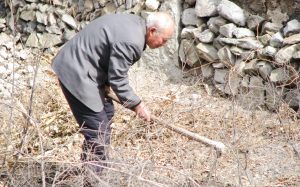In this section, we will consider what it means to think analytically. This approach entails breaking down a topic and then reformulating it to provide a new perspective on what it is about and why it is important. I am especially interested in statements that have this form: “If I think this…., then the implication is this…..”
I am especially interested in statements that have this form: “If I think this…., then the implication is this…..”
Here is my basic proposition: The way we define the world has direct implications for how we make choices and then how we act.
Consider these issues:
What do we mean when we speak about the “human condition”? What do we mean when we speak about “human nature”?
Is human nature the same thing as the human condition? Not really, but how should we distinguish between the two terms?
Does it matter whether there continue to be different conceptions of Hell in our society? Yes.
These questions relate directly to the next concept in our course: Prescription. How is our conception of Hell related to our moral options?
14. Thursday, February 29
To assess the implications of different ideas about Hell, we shall consider a topic that has come up frequently in our discussions: The Human Condition.
To facilitate this discussion, I am asking you to read two of the most vivid chapters in Fyodr Dostoevsky’s extraordinary novel, The Brothers Karamazov.
As you read the chapters, ask yourself: What is Ivan Karamazov’s “argument” about the human condition? What do you make of his recommendations about how we should lives? Focus specifically on his parable about the Grand Inquisitor?
An excerpt from Fyodr Dostoevsky, The Brothers Karamazov. Ivan Karamazov’s sobering thoughts on “Rebellion” and the poem of the Grand Inquisitor.
PRINT AND READ only Chapter IV (“Rebellion”) and Chapter V (“The Grand Inquisitor) HERE
“Chemical Attack in Syria” READ
To bring Dostoevsky’s “argument” up to date, consider these two readings about the science of Free Will: Can we change the human condition by exercising our Free Will? Do we even have Free Will?
Robert Sapolsky says NO: READ
Moshe Szyf and other collaborators say YES (or, perhaps, MAYBE): READ
I like what Szyf concludes about his research with rats: “it wasn’t important what that gene you got from your mother. It was not the biological mother that defined this property of these rats. It is the mother that took care of the pups. …. we spent 10 years, and we found that there is a cascade of biochemical events by which the licking and grooming of the mother – the care of the mother – is translated to biochemical signals that go into the nucleus and into the DNA and program it differently. So now the animal can prepare itself for life.
Paragraph Assignment: “What argument can Alyosha present to effectively rebut Ivan’s horrific depiction of human nature?”
15. Tuesday, March 5
NO CLASS
IMAGE FIVE
UTILITARIANISM: “HELL BY NUMBERS”

15. Thursday, March 7
Discussion:
Today, we will begin to discuss the moral implications of utilitarian judgments of human worth.
Peter Singer, “Taking Life: Humans” PRINT AND READ Please let me now if you have any problems with this link.
Harriet Johnson, “Unspeakable Conversations” PRINT AND READ
Chloé Cooper Jones, “Contemplating Beauty in a Disabled Body,” New York Times, March 29, 2022 RECOMMENDED
“Catholic Social Teaching and the Dignity of the Human Person” PRINT AND READ
What has COVID-19 taught us about our attitudes about the value of human life? Has the pandemic changed our calculations of value?
“Who lives and who dies?” READ
For this discussion, I recommend that you surf around for a very general understanding of the philosophical approach known as “utilitarianism.” Do not worry about identifying all the different types of utilitarianism. Our focus is on Singer’s type.
Paragraph Assignment: What does Singer mean by treating humans humanely? Is he right?
As you read Singer’s work, consider an alternative perspective on human worth that is reflected in the passage from Jacques Maritain below. Maritain was one of the greatest Catholic philosophers of the twentieth century and the intellectual father of Vatican II:
“Let us think of the human being, not in an abstract and general way, but in the most concrete possible, the most personal fashion. Let us think of this certain old man we have known for years in the country—this old farmer with his wrinkled face, his keen eyes which have beheld so many harvests and so many earthly horizons, his long habits of patience and suffering, courage, poverty and noble labor, a man perhaps like those parents of a great living American statesman whose photographs appeared some months ago in a particularly moving copy of a weekly magazine. Or let us of think of this certain boy or this girl who are our relatives or our friends, whose everyday life we well know, and whose loved appearance, whose soft or husky voice is enough to rejoice our hearts . . . . We perceive intuitively, in an indescribable not inescapable flash, that nothing in the world is more precious than one single human being.”
—Jacques Maritain, “The Immortality of Man” (1941)
I thought of this passage when I ran into this farmer in the four hundred year-old peasant village, Cuandixia, near Beijing. Note how he is dressed.
into this farmer in the four hundred year-old peasant village, Cuandixia, near Beijing. Note how he is dressed.
MID-TERM BREAK: MARCH 9-17
17. Tuesday, March 19
The Second Great Debate!
Topic: “When it comes to human dignity, Singer is far more humane than the Roman Catholic Church”
Relevant sections of the Vatican’s “Compendium of the Social Doctrine of the Church”: PRINT AND READ
Important background information on the humane treatment of non-homo sapiens: WATCH
Your second writing assignment is HERE
IMAGE SIX
POVERTY: “POOR AS HELL”
18. Thursday, March 21

Discussion: How should we describe American poverty? How can we explain it?
In this section, we will concentrate on one of the primary sources of poverty in the US: Eviction.
Matthew Desmond, Evicted: Poverty and Profit in the American City: READ the Prologue and chapters 1-5, 8, 12.
I am not poor; I have never been poor. I have certainly never been evicted. Chances are, this is the case with most–if not all–of you. Thus, when we think and talk about poverty and then seek to explain it, we are challenged to understand something we have never experienced.
Identify the central argument in this review of Robert Putnam, Our Kids: The American Dream in Crisis READ
Eviction Lab: Tracking Eviction CONSIDER
We can also seek to understand poverty by asking what it means to be fabulously wealthy
About Mona Chalabi’s “Nine ways to imagine Jeff Bezos’ Wealth” READ
19. Tuesday, March 26
We who are strong have an obligation to bear with the failings of the weak, and not to please ourselves.”
ROMANS 15:1
What are our obligations to the poor, if any? Assuming we have obligations: 1) where do they come from? and 2) what should they be? Is there anything we can learn from the poor?
Matthew Desmond, Evicted: Poverty and Profit in the American City: READ chapters , 15-16, 24, and the Epilogue.
As you reflect on the stories in Evicted, ask yourself: What are the implications of the way we explain poverty? How do different explanations support or, conversely, our moral obligation to help the poor?
The authors of this article identify a moral obligation in the proposition that poverty is the consequences of structural barriers.
Heather Hahn and Margaret Simms, “Poverty Results from Structural Barriers, not Personal Choices” PRINT AND READ
In contrast, Garrett Hardin’s understanding of the sources of poverty leads him to believe that we have, at best, a minimal obligation to help the poor.
Garrett Hardin, “Lifeboat Ethics: The Case Against Helping the Poor”: PRINT AND READ
Which side would Desmond support? Or would he/could he support parts of each side?
20. Thursday, March 28
It’s just before Easter, so let’s talk about Jesus.
Jesus on the Poor:
Mark 12:41-44
He sat down opposite the treasury, and watched the crowd putting money into the treasury. Many rich people put in large sums. A poor widow came and put in two small copper coins, which are worth a penny. Then he called his disciples and said to them, ‘Truly I tell you, this poor widow has put in more than all those who are contributing to the treasury. For all of them have contributed out of their abundance; but she out of her poverty has put in everything she had, all she had to live on.’
14 What good is it, my brothers and sisters,[a] if you say you have faith but do not have works? Can faith save you? 15 If a brother or sister is naked and lacks daily food, 16 and one of you says to them, “Go in peace; keep warm and eat your fill,” and yet you do not supply their bodily needs, what is the good of that? 17 So faith by itself, if it has no works, is dead.’
Once you have pondered these passages, think about what role the concept of “equality of opportunity” plays in American attitudes about poverty.
The Stanford Encyclopedia of Philosophy’s definition of “Equality of Opportunity.”
Equality of opportunity is a political ideal that is opposed to caste hierarchy but not to hierarchy per se. The background assumption is that a society contains a hierarchy of more and less desirable, superior and inferior positions. Or there may be several such hierarchies. In a caste society, the assignment of individuals to places in the social hierarchy is fixed by birth. The child acquires the social status of his or her parents at least if their union is socially sanctioned. Social mobility may be possible in a caste society, but the process whereby one is admitted to a different level of the hierarchy is open only to some individuals depending on their initial ascriptive social status. In contrast, when equality of opportunity prevails, the assignment of individuals to places in the social hierarchy is determined by some form of competitive process, and all members of society are eligible to compete on equal terms.
Easter: March 29 – April 1
NOTE: Please leave your technology at home. This includes electronic devices of any kind, such as laptops, i-Pads, cell phones, Kindles, x-Boxes, clouds, video cameras, or other personal digital devices